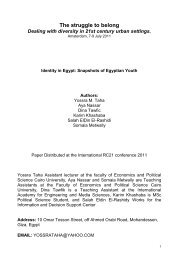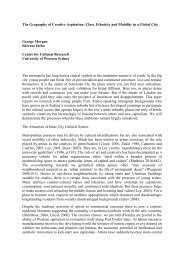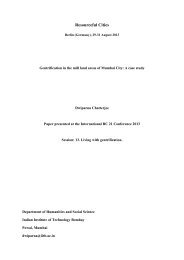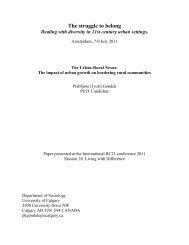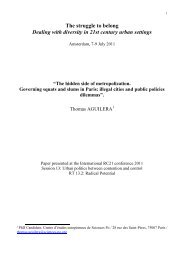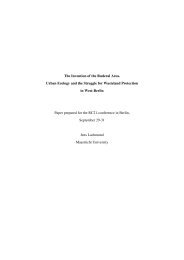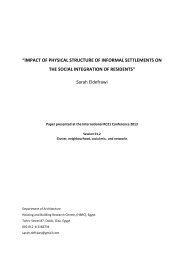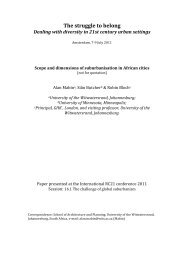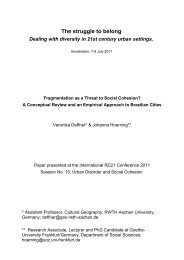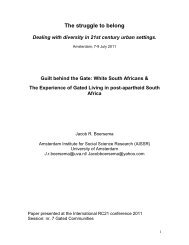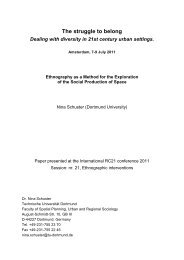Gentrification as a broad process of reurbanization - RC21 ORG ...
Gentrification as a broad process of reurbanization - RC21 ORG ...
Gentrification as a broad process of reurbanization - RC21 ORG ...
You also want an ePaper? Increase the reach of your titles
YUMPU automatically turns print PDFs into web optimized ePapers that Google loves.
Judit Veres CEU Budapest<br />
This h<strong>as</strong> implications on what Trafó is currently presenting too and what it will be<br />
able in producing in the future. One <strong>of</strong> the interesting and already visible results is<br />
that for the p<strong>as</strong>t one year Trafó h<strong>as</strong> brought to Hungary dance–theatre productions<br />
from Lebanon, Iran, Syria, Egypt, Brazil, China and h<strong>as</strong> a series <strong>of</strong> Indian sacral<br />
music too.<br />
The other felt consequence <strong>of</strong> the eclipsed importance <strong>of</strong> this region for the Western<br />
powers is that while so far most <strong>of</strong> the project partnerships have taken place in a way<br />
that encouraged Central-E<strong>as</strong>tern European cultural organization to prioritize mostly<br />
western partners, now there is an incre<strong>as</strong>ing necessity, curiosity towards building up<br />
regional partnerships. At the end <strong>of</strong> December 2010 Trafó organized a symposium<br />
inviting around 25 similar performing arts institutions from the region with the<br />
explicit aim to create future partnerships with Central-E<strong>as</strong>tern European<br />
organizations.<br />
Being dependent on public money Trafó tries hard to respond also and reflect on<br />
current domestic affairs. This fact is well shown by one <strong>of</strong> its 2011 January<br />
programmes on the occ<strong>as</strong>ion <strong>of</strong> Hungary‘s European presidency. ―Presi-Danses― w<strong>as</strong><br />
a series <strong>of</strong> three choreographies presenting a Spanish, a Belgian and a Hungarian<br />
production in the frame <strong>of</strong> the Spanish-Belgian-Hungarian EU presidency.<br />
Since 1998 Trafó h<strong>as</strong> developed and preserved a reputation <strong>of</strong> a progressive,<br />
cosmopolitan cultural institution, reputation that h<strong>as</strong> been fed by the right wing media<br />
too but with a more pejorative and dismissive undertone.<br />
In the aftermath <strong>of</strong> the general elections in 2010 with the set in <strong>of</strong> the current right<br />
wing government the institution‗s position h<strong>as</strong> suddenly become more precarious. So<br />
far the appointment <strong>of</strong> the managing director by the h<strong>as</strong> not been directly questioned.<br />
He h<strong>as</strong> been in this position for 12 years now and Trafó h<strong>as</strong> attained its reputation<br />
largely thanks to his work. According to the cultural practitioners I talked to, Trafó<br />
enjoys a wider appreciation a<strong>broad</strong> than in Hungary, mainly thanks to the continuity<br />
represented by Gyuri Szabó. The fact that it exists for 12 years is something <strong>of</strong> a rarity<br />
in an otherwise constantly changing scene where cultural venues pop up, their front<br />
person changes and they disappear. This time there are rumors that the Municipality<br />
will have its own person run <strong>as</strong> a candidate in a competition that is feared to openly<br />
favor the latter. Hence the stakes <strong>of</strong> maintaining its progressive orientation are higher<br />
19




